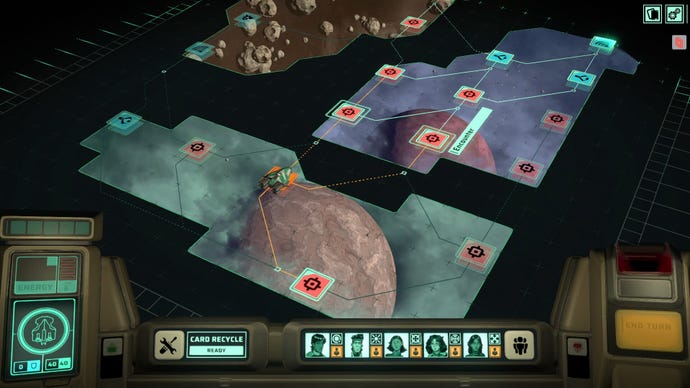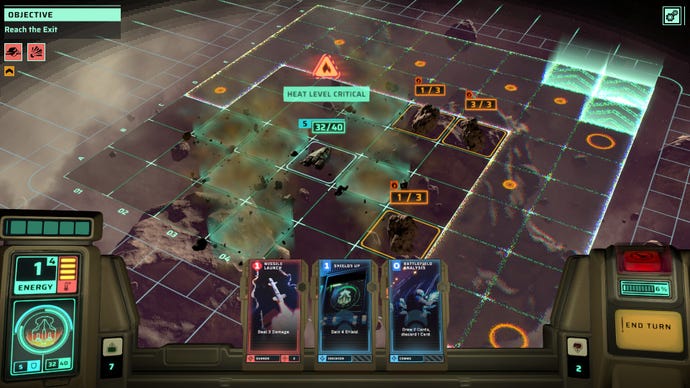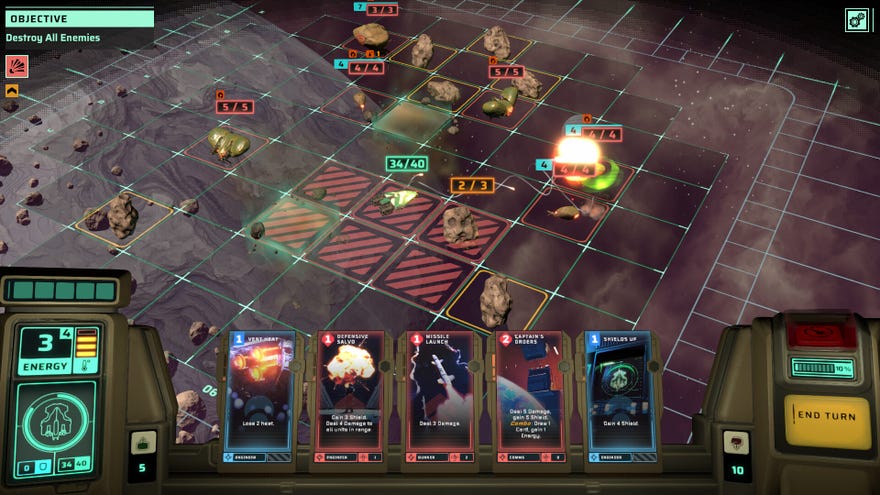Earthless is a Homeworld-esque cardgame, and a pretty good time
All hands on deck
Blackbird Interactive's next big thing is Homeworld 3, out February 2024, but Homeworld 3 has a little cousin, a new IP named Earthless, which tells approximately the same tale of a colony ship fleeing across the galaxy, but takes the form of a deck-building roguelite cardgame. Never one to say no to a bout of space strategy, I fired up a preview key over the weekend, and while I wouldn't say my pulse has jumped to hyperspace, I'm certainly enthused.
In Earthless, our sun has rudely gone supernova billions of years ahead of schedule, and everybody with a rocketship and a starchart is making a beeline for the nearest exoplanet capable of supporting life. Each run sees you moving your ship between nodes grouped into regions, with nodes consisting broadly of resourcing opportunities that bestow new cards, branching story-led progression moments in which you decide which ship systems to upgrade, and grid-based clashes with a peculiar alien race, who look a bit like angry Cornish pasties.


Rather than giving you a bewildering 3D volume to wallow around in, like Homeworld, Earthless unfolds on a holographic sandtray, with cards representing ship abilities that socket pleasingly into the rim of the table. Each turn, you can move your ship and spend energy to play those randomly drawn cards, which range from simple missile launches to slowing time to play a card twice, or powering up your shields in anticipation of bombardment. Moving generates heat, and if your ship overheats it'll need to cool off before you can move again, so you'll want to time those boosts carefully to avoid becoming a sitting/roasted duck.
Maps are dinky enough to fit into the screen without a zoom function, but also busy and intricate in a way that, at its best, reminds me of Into The Breach. You can expect fog-of-war with anomalous radar signals, obstacles such as gas clouds that rot your ship's hull, and random variables such as excess solar radiation that damages all ships every turn. Sometimes you have to moider all the other vessels, including scripted reinforcement waves that may pop up behind you, and sometimes you just need to make it to the exit square. You're always out-numbered, so there's a pleasing emphasis on crowd control - for example, luring the extra-terrestrial armada into terrain traps, like asteroids that explode on destruction. And then there are the bosses, who can be so voluminous they fill one side of the map.
It's too early to judge the deck-building stuff, but Earthless is off to a good start in the eyes of this not-especially-habitual cardgame player. You earn cards from victories and exploration, and can discard them to make room at set intervals. You can also craft and modify cards so that, for example, you generate a smidgeon of shield energy when you emergency-vent heat.
I'm gently impressed by how my tactical options evolved in the course of a handful of turns over half-an-hour of play. Further afield, there's the prospect of crew mutinies should you focus too heavily on upgrading one particular aspect of your ship - a perma-debuff, basically, which you might prefer to either avoid or tolerate for the sake of the bonuses you'll earn by favouring certain crew members.
I can't see Earthless out-manouevring the likes of Slay the Spire, nor does it have quite the swagger of other forthcoming Battlestar Galact 'em ups like Jumplight Odyssey, but I do want to play more. Earthless could tidy me over nicely till the new Homeworld's release day. A shame, then, that its Steam early access release is also pegged for 2024.










